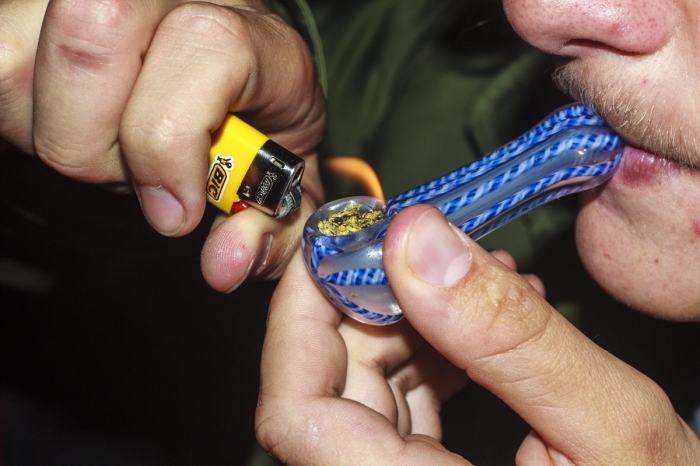You are here
Home 🌿 Cannabis Technology News 🌿 Marijuana is becoming more potent, but also more popular, UMD study says 🌿Marijuana is becoming more potent, but also more popular, UMD study says

While the number of people who view marijuana as posing "no risk" increases, highly potent forms of the drug are becoming more common, which may cause greater negative effects, according to a 2017 report by this university's public health school.
The percent of THC, the active ingredient in marijuana that causes a high, has increased from 4 percent to 12 percent in the 19-year period between 1995 and 2014, according to the study, which was conducted in collaboration with the Hazelden Betty Ford Foundation.
Synthetic marijuana, which can have THC concentrations of up to 80 percent, has also "increased dramatically in popularity," as well as a new method of consumption called "dabbing," in which vapor from heating a concentrated oil or wax form of marijuana is inhaled by the user, according to the report.
The study claims using higher-potency marijuana carries a higher risk of negative outcomes, such as "cognitive problems, underachievement in school and risk for dependence, especially for youth," compared to traditional forms of marijuana.
Users of synthetic cannabis are 30 times more likely to visit the emergency room than users of traditional forms of cannabis, and users of high-potency marijuana are five times more likely to experience a psychotic disorder than those who don't, according to the report.
Even though these new forms of consuming high-potency marijuana potentially carry higher health risks, they are increasing in popularity.
"The percentage of adults and adolescents who believe regular use of marijuana poses 'no risk' tripled from 5 percent in 2004 to 15.3 percent in 2014," the report states.
Yusuf Mahmood, president of this university's Young Americans for Liberty chapter, said the perception marijuana is harmless "is a consequence of irresponsible campaigning" by some advocates of the drug's legalization.
Young Americans for Liberty advocates the legalization of drugs not because they are safe, but because keeping them illegal puts no checks on their potency and encourages drug-related violence, said Mahmood, a sophomore economics and philosophy major.
Ronald Lyles, a sophomore history major, said marijuana use poses no risks. A handful of other students smoking cigarettes outside of McKeldin Library Wednesday afternoon nodded in agreement. Seeing the positive effects of medical marijuana helps people have a better perception of the drug, he added.
Stephen Barber, founder of Washington cannabis news source Capital Canna News, said the perception regular marijuana use poses no risk "is a true one," even with cannabis oils that have 97 percent THC concentration.
"You can't bullshit people forever, and I think that the government was successfully able to bullshit people for a very long time," Barber said. "The vast majority of the American public who have simply been exposed to cannabis and … information about its benefits can see that all this 'Reefer Madness' and 'Just say no' stuff about cannabis is no more than a pack of lies."
Mahmood said people smoke it or see others smoking it and find out some of the things the government has said about marijuana aren't true, leading them to make "false conclusions that everything the government has said about marijuana is a lie," or that it's completely harmless.
Studies on marijuana have been historically difficult to conduct because of the classification of marijuana as a Schedule I drug under the Controlled Substances Act, Mahmood said. According to the act, drugs which have a high potential for abuse, have no accepted medical use and are unsafe under medical supervision qualify for Schedule I classification.
Heroin, LSD and ecstasy also fall under this classification. The government has rejected appeals to reclassify marijuana.
Because Schedule I drugs have a high potential for abuse, the Drug Enforcement Agency requires researchers to apply for a government license to study them. This can prevent long-term studies on marijuana and other Schedule I drugs from being carried out, Mahmood said.
"The only real issue that people possibly have by consuming large amounts of high purity cannabis is that they will simply go to sleep or need to take a nap," Barber said. "There's no sign of any risk of any long-term health impairments or any immediate medical dangers that can come from smoking highly potent marijuana."
Mahmood said drug education should be approached in the same way as modern sex education. Rather than preaching complete abstinence from drug use, adolescents should learn in school the risks of drug use and how to safely consume drugs. This won't happen as long as drugs are illegal, he added.
"People need jargon-free, scientifically accurate, and personally relevant information to make an informed decision about any health issue," Cynthia Baur, director of the Horowitz Center for Health Literacy and professor in the public health school, wrote in an email.
420 Intel is Your Source for Marijuana News
420 Intel Canada is your leading news source for the Canadian cannabis industry. Get the latest updates on Canadian cannabis stocks and developments on how Canada continues to be a major player in the worldwide recreational and medical cannabis industry.
420 Intel Canada is the Canadian Industry news outlet that will keep you updated on how these Canadian developments in recreational and medical marijuana will impact the country and the world. Our commitment is to bring you the most important cannabis news stories from across Canada every day of the week.
Marijuana industry news is a constant endeavor with new developments each day. For marijuana news across the True North, 420 Intel Canada promises to bring you quality, Canadian, cannabis industry news.
You can get 420 Intel news delivered directly to your inbox by signing up for our daily marijuana news, ensuring you’re always kept up to date on the ever-changing cannabis industry. To stay even better informed about marijuana legalization news follow us on Twitter, Facebook and LinkedIn.




